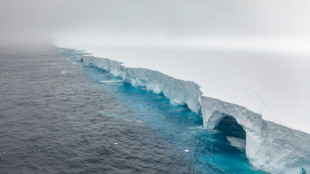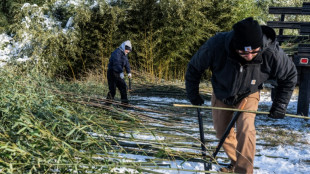
-
 Universal, Spotify ink multi-year deal
Universal, Spotify ink multi-year deal
-
Undersea cable between Sweden and Latvia damaged, both countries say

-
 'Neo-Dandies' and Trump fears at Paris Men's Fashion Week
'Neo-Dandies' and Trump fears at Paris Men's Fashion Week
-
Belarusians near Ukraine border long for end to war

-
 US Fed prepares to pause in first rate decision since Trump's inauguration
US Fed prepares to pause in first rate decision since Trump's inauguration
-
Survivors centre stage for 80th anniversary of Auschwitz liberation

-
 Rubbish roads: Nepal explores paving with plastic
Rubbish roads: Nepal explores paving with plastic
-
US stocks retreat while yen gains on Bank of Japan rate hike

-
 Serbians strike in protest over fatal roof collapse
Serbians strike in protest over fatal roof collapse
-
Meta plans to invest $60 bn or more in AI this year

-
 Power cuts and transport chaos as Storm Eowyn hits Ireland and UK
Power cuts and transport chaos as Storm Eowyn hits Ireland and UK
-
Croatians boycott shopping to protest high prices

-
 US home sales in 2024 weakest in nearly 30 years
US home sales in 2024 weakest in nearly 30 years
-
'White wall' of ice drifts toward remote penguin haven

-
 Stocks diverge as investors weigh earnings, Trump policies
Stocks diverge as investors weigh earnings, Trump policies
-
Beached whales: Airbus grounds its massive Beluga cargo flights

-
 IMF chief tells Europe to take page out of US book
IMF chief tells Europe to take page out of US book
-
Bob Dylan a contrast to 'narcissistic' modern stars, says biopic director

-
 Saudis showcase charm offensive in Davos
Saudis showcase charm offensive in Davos
-
Maltese businessman accused in journalist's murder granted bail

-
 Kazakhstan delays release of Azerbaijan plane black box data
Kazakhstan delays release of Azerbaijan plane black box data
-
France asks EU to delay rights, environment business rules

-
 Troubled Burberry shows sign of recovery despite sales drop
Troubled Burberry shows sign of recovery despite sales drop
-
Italy's Monte dei Paschi bids 13.3 bn euros for Mediobanca

-
 How the Taliban restrict women's lives in Afghanistan
How the Taliban restrict women's lives in Afghanistan
-
Bank of Japan hikes interest rate to 17-year high, boosts yen

-
 Catalonia eyes reversal of business exodus after big bank returns
Catalonia eyes reversal of business exodus after big bank returns
-
Tajikistan launches crackdown on 'witchcraft' and fortune-telling

-
 Bank of Japan hikes interest rate to 17-year high, signals more
Bank of Japan hikes interest rate to 17-year high, signals more
-
Asian markets build on Trump rally, yen climbs after BoJ cut

-
 Survivors strive to ensure young do not forget Auschwitz
Survivors strive to ensure young do not forget Auschwitz
-
Asian markets build on Trump rally, yen steady ahead of BoJ

-
 OpenAI unveils 'Operator' agent that handles web tasks
OpenAI unveils 'Operator' agent that handles web tasks
-
Bamboo farm gets chopping for US zoo's hungry new pandas

-
 Fear in US border city as Trump launches immigration overhaul
Fear in US border city as Trump launches immigration overhaul
-
242 mn children's schooling disrupted by climate shocks in 2024: UNICEF

-
 US Republicans pressure Democrats with 'born-alive' abortion bill
US Republicans pressure Democrats with 'born-alive' abortion bill
-
Trump Davos address lifts S&P 500 to record, dents oil prices

-
 Between laughs and 'disaster', Trump divides Davos
Between laughs and 'disaster', Trump divides Davos
-
Hundreds of people protest ahead of Swiss Davos meeting

-
 US falling behind on wind power, think tank warns
US falling behind on wind power, think tank warns
-
US news giant CNN eyes 200 job cuts, streaming overhaul

-
 Rubio chooses Central America for first trip amid Panama Canal pressure
Rubio chooses Central America for first trip amid Panama Canal pressure
-
Wall Street's AI-fuelled rally falters, oil slumps

-
 Trump tells Davos elites: produce in US or pay tariffs
Trump tells Davos elites: produce in US or pay tariffs
-
Progressive politics and nepo 'babies': five Oscar takeaways

-
 American Airlines shares fall on lackluster 2025 profit outlook
American Airlines shares fall on lackluster 2025 profit outlook
-
France to introduce new sex education guidelines in schools

-
 Wall Street's AI-fuelled rally falters
Wall Street's AI-fuelled rally falters
-
Drinking water in many French cities contaminated: study


Rubbish roads: Nepal explores paving with plastic
Cars speeding along a smooth, black-coloured street in Nepal's Pokhara are also driving over heaps of discarded plastic, transformed into an ingredient in road construction.
Nepal's urban areas generate about 5,000 tonnes of solid waste per day, according to the World Bank, of which 13 percent is plastic waste dumped in landfills.
While high-value plastics, like bottles, are absorbed by the recycling industry, low-value plastics -- such as multi-layered packaging -- pose a significant challenge because they don't fit into a single recycling category.
For a group of young Nepali entrepreneurs, the vast accumulation of this low-value plastic waste presented an opportunity.
"A plastic road can use even low-value plastics," said Bimal Bastola, founder of Green Road Waste Management, the organisation leading the initiative in Nepal.
"We saw scope for such plastics to be utilised as a raw material, partially substituting bitumen in road construction."
Discarded packages of noodles, biscuits and other snacks move along a conveyor belt at their trash-sorting centre.
The divided plastic is then put into machines to be shredded into fine pieces.
Since the early 2000s, neighbouring India has been leading the world in building a network of plastic roads, even making the usage of plastic waste mandatory in roads near large cities in 2015.
A growing number of countries are experimenting with it, including nearby Bhutan and Bangladesh.
In traditional road construction, bitumen is the binding material, a tarry oil product mixed directly with hot aggregates before paving a road.
The plastic road method, however, first coats the aggregates with shredded plastic before adding bitumen.
"This method reduces the need for fresh raw materials, lowers costs, prevents water infiltration and increases road lifespan," Bastola said.
Studies show that roads paved with plastic waste can be twice as durable as normal roads.
- 'Scale up' -
Globally, only nine percent of plastic waste is recycled, while 19 percent is incinerated, and nearly half ends up in controlled landfills, according to the Organisation for Economic Cooperation and Development (OECD).
Left unchecked, the production of synthetic polymers -- the building blocks of plastics -— is expected to reach about 1.2 billion tonnes annually by 2060.
The plastic that accumulates in the environment is non-biodegradable, takes hundreds of years to decompose and breaks down into tiny microscopic particles.
And while Nepal banned single-use plastic bags thinner than 40 microns, that ban is not strictly implemented.
For Bastola, increasing plastic road construction is key to making the recycling of low-value plastics economically viable.
His organisation says about two tonnes of shredded plastic is used to build a kilometre of road.
So far, the organisation has completed about 10 projects totalling a little over 1.5 kilometres (one mile).
"It is happening at a small scale, we need to scale up," Bastola said. "We have to make government-level projects and we are trying to work closely with the department of roads."
A pilot project is planned this year in the capital Kathmandu at a major intersection.
"Nepal is keen on testing this technology through pilot projects," said Arjun Nepal, an engineer with the Kathmandu road department.
"But to take it forward, we need government-led standards to ensure quality."
The World Bank says life cycle analyses of plastic roads are limited and it is still not clear what environmental impacts -- if any -- recycled plastics may have when used in road construction.
"While initial anecdotes and pilot studies show promise, further research is needed to measure emissions during production, evaluate microplastic release over time and determine how these roads behave once they are decommissioned," said Valerie Hickey, global director of the World Bank's climate change group.
Despite these concerns, environmentalist Bhushan Tuladhar said that plastic roads present an important opportunity for Nepal.
"It is a low-hanging fruit to address two problems simultaneously -- the need for strong roads and the management of plastic waste -- for a developing country like Nepal," he said.
Y.Jeong--CPN
